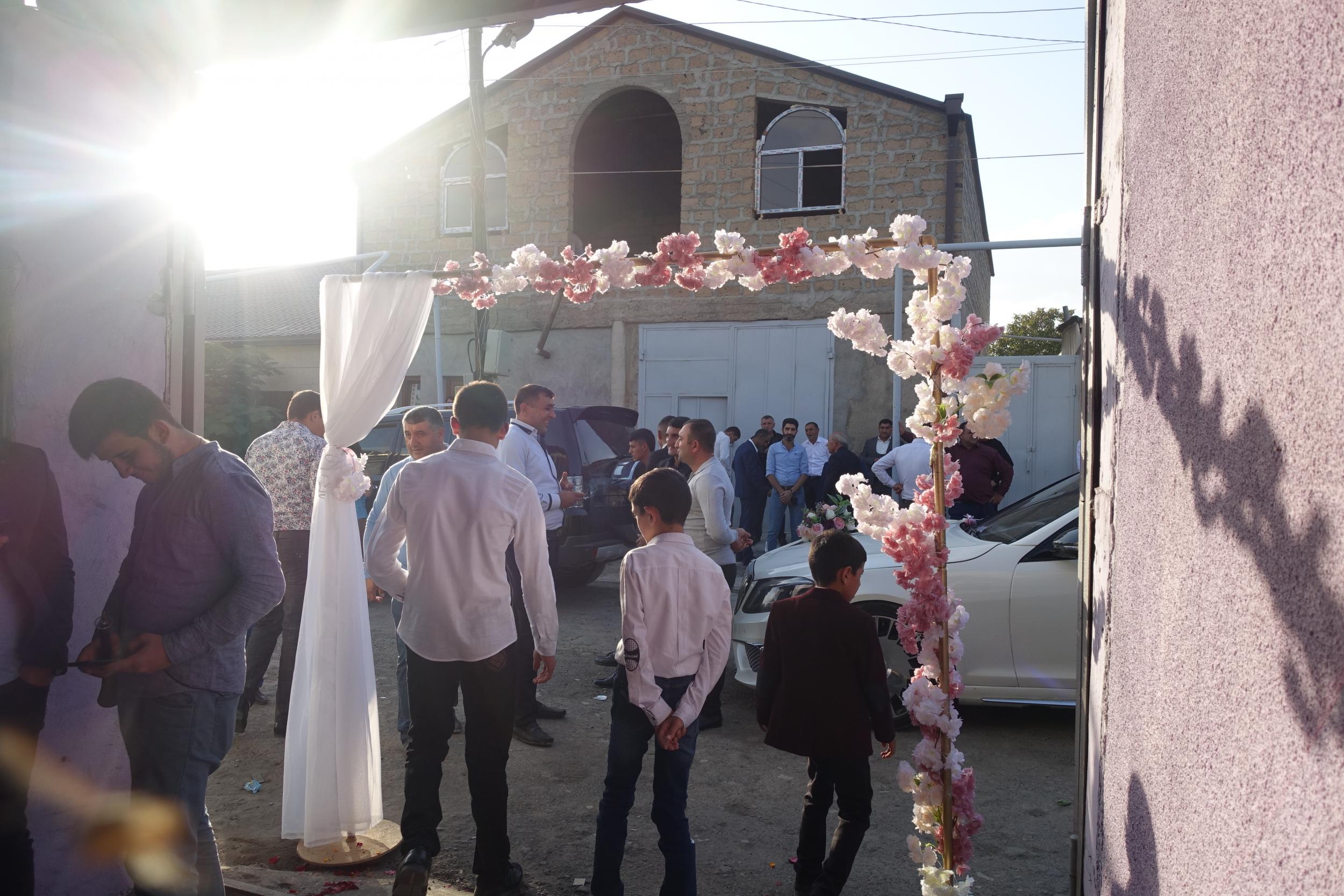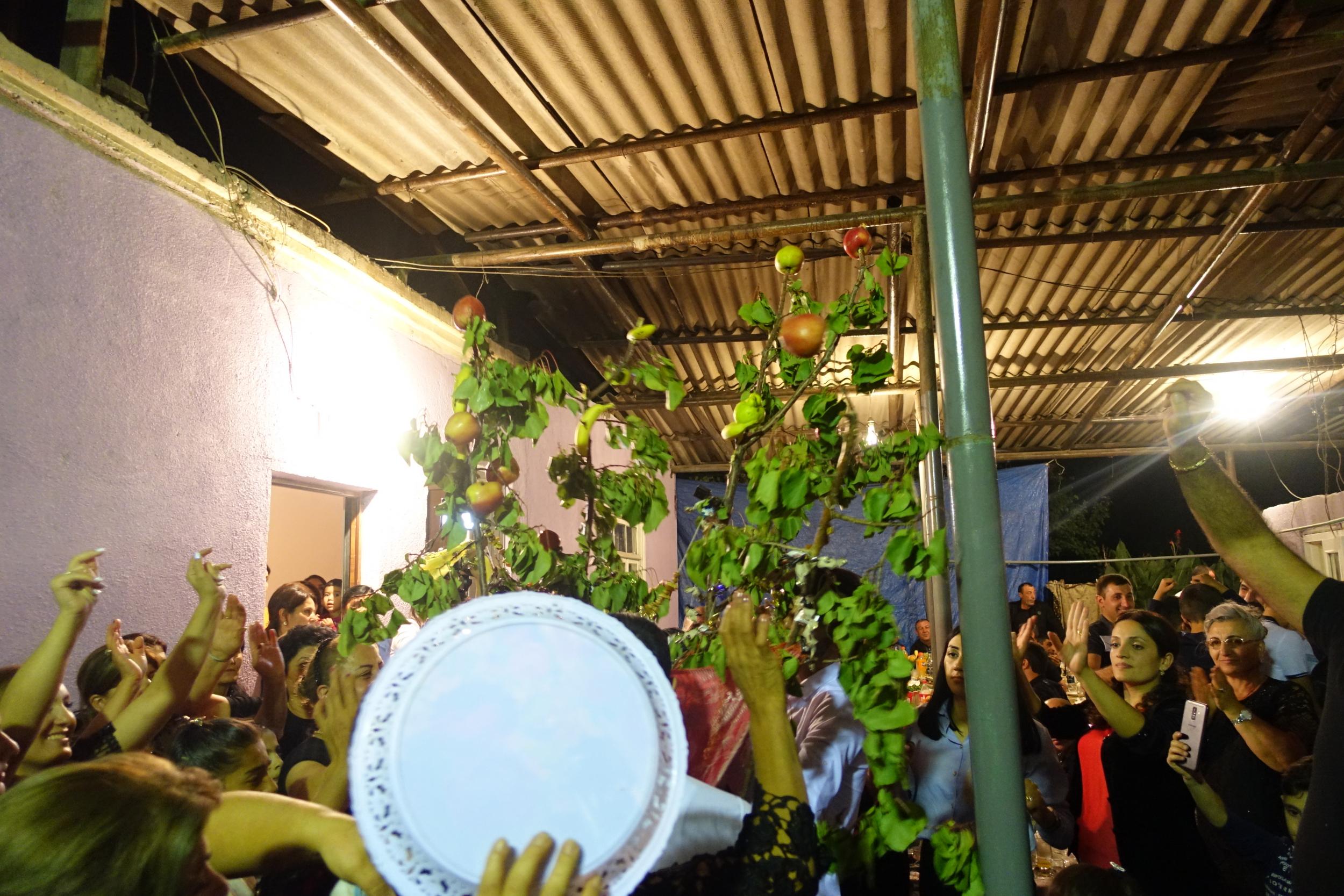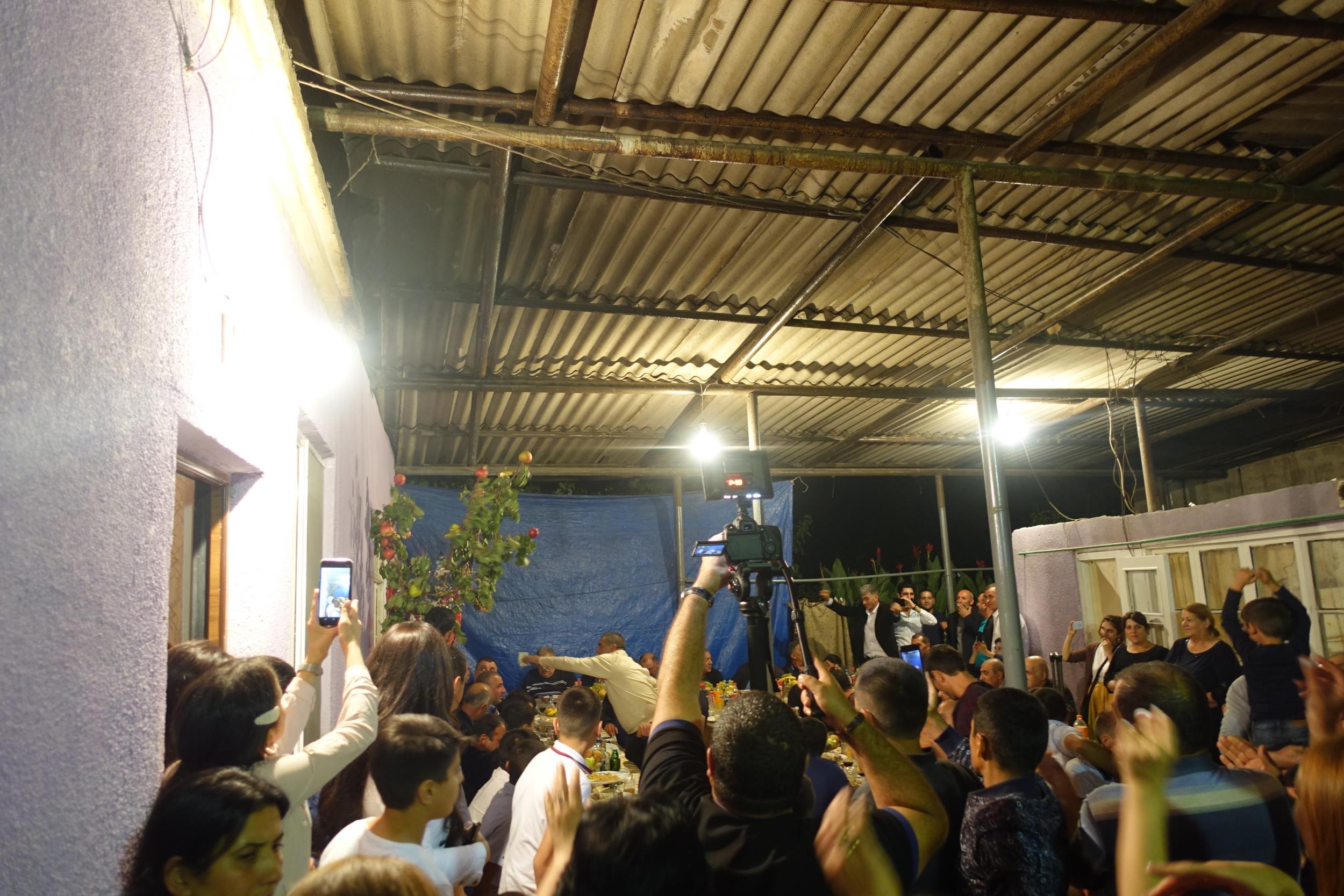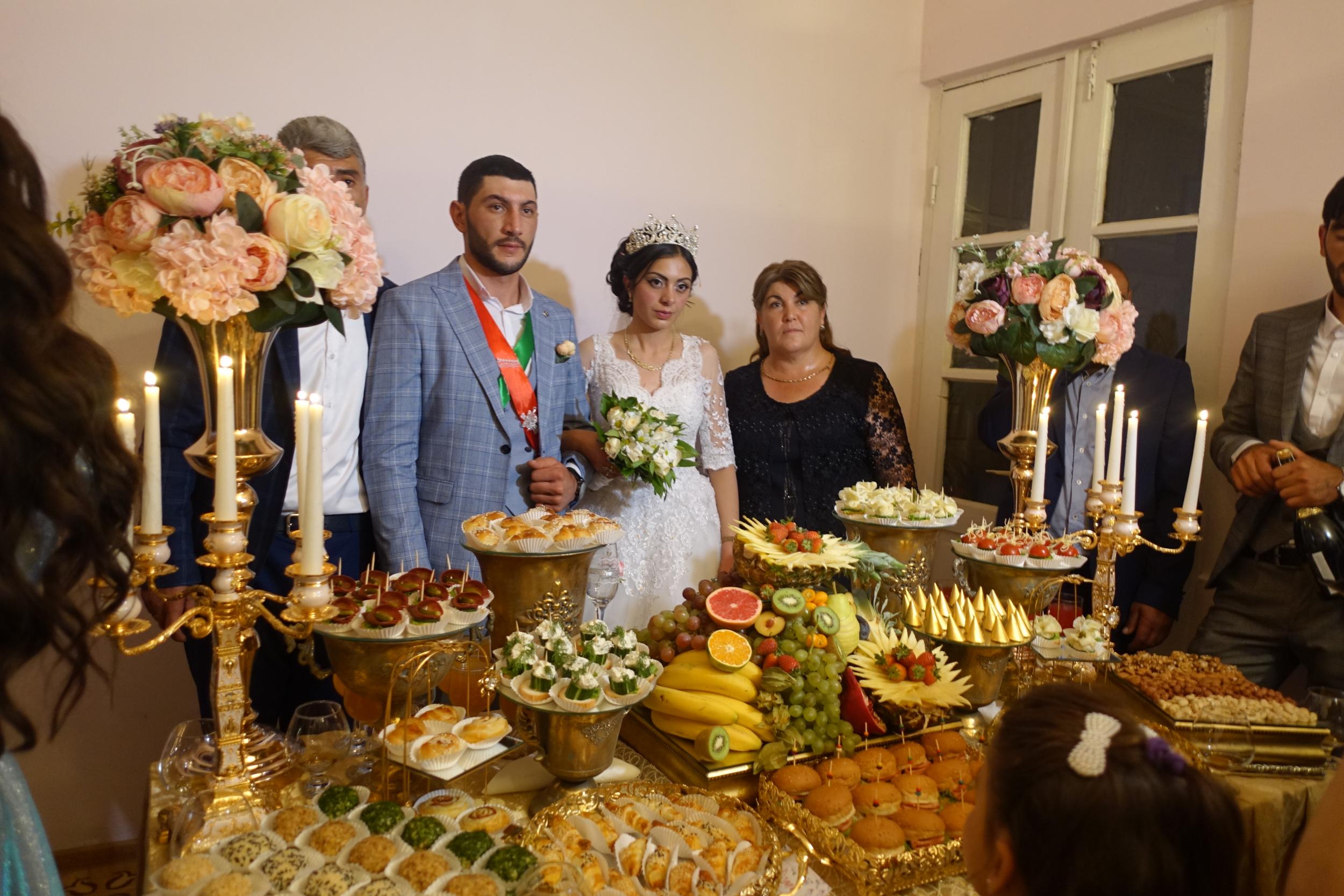Sweet bread, apples and the tree of happiness: Yazidi weddings bring persecuted community together
‘It’s really important for us to attend these events and maintain these traditions, especially now that many of us live abroad,’ wedding guest tells Lemma Shehadi


The dirt roads of Aintab, a village outside the Armenian capital of Yerevan, are narrow and rocky. But they are just wide enough to fit a procession of honking cars. Heading the convoy is a white Mercedes decorated with pink flowers and white ribbons.
The driver has brought Jemma, 19, a newlywed bride, to the 21-year-old groom Artur’s family home.
As she walks out of the car towards the house, a trio of musicians play the drums and zurna, an eastern Anatolian flute. The groom’s family and friends dance around her, holding up loaves of sweet bread and other welcome gifts.
The bride paces slowly in her large white dress, and her head tilts towards the floor.
“The bride should look sad because she is leaving her home,” says a guest. “This is traditional in Armenia.” Occasionally, the groom tries to catch her eye, but she looks away and suppresses a smile.
The newlyweds are both Yazidis, a Kurdish-speaking ancient religious minority whose main population is currently concentrated in northern Iraq. Yazidi settlements in the Caucasus migrated from eastern Turkey in the 19th and 20th centuries. Most of those families fled persecution against non-Muslim minorities during the Ottoman empire.
Today, Yazidis in the Caucasus number at less than 50,000 people, with more than double that number now living in Russia and Europe.
In Iraq, the community has faced a deep crisis after Isis militants invaded the Yazidi heartland of Sinjar in 2014, raping, killing and kidnapping thousands.
Now scattered, weddings are among the few events that bring the once close-knit community together. “It’s really important for us to attend these events and maintain these traditions, especially now that many of us live abroad,” says Titale Makhmudov, a guest at the wedding who came from France.
Weddings also attest to the challenges that the small, nationless minority faces in preserving its traditions and culture.
The two-day celebrations begin and end at the groom’s home. On the eve of the wedding, the groom’s parents host a dinner for their family and friends, to prepare gifts for the bride. Men sit around a long table making toasts. The groom’s aunt and her friends prepare the meal in the kitchen. They serve Armenian dishes such as meatballs with rice, and plates of cheese and salad. “It’s about two days of preparation,” says the groom’s aunt.
The ceremonies are replete with symbolism. Among these is the Tree of Happiness and Desires, a large tree branch which serves as a gift to the bride. “It has to be a fruit tree, that is taken out from the roots, and never hacked off,” explains a guest. “The tree is a symbol that the young family will grow safely.” At the end of the meal, accompanied by the musicians, guests carry the tree and dance around it, hanging fruits, sweets and money to its branches.

The next day, after the bride’s arrival, the groom throws an apple at her head. According to tradition, if the bride is still a virgin, the apple should break on contact. “Today we slice the apple beforehand, so as not to hurt the bride,” explains one guest, in the commotion. Then, the groom’s friends shake the tree over the bride, showering her with its contents. A silk pillow is passed around the couple as a symbol of their long life together.
The band performs regularly at Yazidi weddings. “We’ve been playing together for five years, and we travel out of Armenia for weddings three to four times a month,” says drummer Yura Shaqryan. “The traditions have not changed much, they’re the same as in older times.” Their lead singer, Artur Safoyan, sings a song about bringing the bride to her new home and another about baking bread for the ceremony.
Though guests have come from Europe, Russia and Turkey, not everyone can attend. In the kitchen, the women pass a phone around, waving and blowing kisses at the screen. They are speaking to the groom’s sister, who lives in France. She could not travel that week and cries as she watches the party over a video call.
According to their religion, Yazidis can only marry other Yazidis, and their marriages follow a strict caste system. The religion does not accept converts, and those who marry outside of the community are no longer considered to be part of the faith.
“We are a small minority and marrying within the community helps to protect us from assimilation,” says Reza Muradyan, a shop owner living in the Georgian capital of Tbilisi.
But challenges facing the community today have tested this institution. “Many families in Georgia and Armenia have stopped following our traditions. There was nobody that I could marry within my community,” he adds.
Reza is a member of the pir caste, a caste of priests where the number of families is the most limited. Some pir families are forbidden to intermarry, which further restricts their marriage pool.

To meet his wife, Khalfa Saeed Hasan, he travelled to Iraq with his father. “When Khalfa and I met the first time, we spoke alone in her home for three hours,” recalls Reza.
From the start, their union was mired in difficulties. After Isis’s invasion in 2014, Khalfa and her family fled their homes to a refugee camp, where she lived for two years. The pair married in the camps in 2016. “It was a small ceremony. Khalfa and I exchanged rings,” says Reza.
Bringing Khalfa to Georgia posed a further challenge, as the country tightened its entry requirements for Iraqis in the immediate aftermath of the war. The couple described the delays in acquiring Khalfa’s residency status.
Part of the issue was that their marriage was not recognised in Georgia, where the legal age for marriage is 18.
Teenage marriages are still common in Iraq, and in more conservative communities in the Caucasus. In Armenia, the minimum age for women to marry was lowered to 16 in 2012 at the request of a Yazidi lobby group. The tradition has been criticised by younger generations of Yazidi activists.
“Our customs have evolved in the Caucasus. Fifty years ago, the bride and groom met on the day of their wedding,” says Reza.

Today, the pair work together at Reza’s family-owned business selling household objects and bicycle equipment in the heaving suburb of Gldani. Reza and his father serve their community as priests.
Their union is one of the rare reported marriages across Iraqi and Caucasian communities, after generations of geographical separation. “We are the only such couple in Georgia,” insists Reza.
It reflects the new interest that Caucasian Yazidis are taking in their heartland in northern Iraq. “In 2012, I traced my family back to a village in northern Iraq. I travelled there to meet our distant relatives,” explains Reza’s father Raso Muradyan. “Then my son came with me in 2014.”
In recent years, many Yazidi families in Georgia and Armenia have sought to restore the original surnames they had before their migration to the Caucasus. “Often, local authorities objected to the name change. We had to prove our family’s origins and make a request to the government. Some historians in the community assisted individual families in doing this,” explains Elene Khudoiani, a Tbilisi-based advocate.
Reza has yet to legally restore his old surname, but, like many others from his community, he uses it on social media platforms. He shows pictures of a small temple dedicated to his ancestors in the region of Bahzan, in northern Iraq. “I’m proud of my family’s history,” says Reza. Khalfa and her husband are from the same tribe in northern Iraq. “Our families were separated more than two hundred years ago,” she says.
For Khalfa, who spent her teenage years in a refugee camp, the union with Reza holds the promise of a new life. “I would not go back to Iraq,” she says. More than 400,000 Yazidis, including Khalfa’s mother, are reported to be living in refugee camps in Iraq today. The conflict interrupted her schooling.
She and her husband speak in their shared language of Kurdish, and Khalfa is learning Georgian. “My family is teaching me,” she says, “I don’t think I will go back to school.” From her husband’s phone, she shows pictures of parks and attractions that she has recently visited around the city and its outskirts.
The biggest challenge, Khalfa says, is being away from her family in Iraq. “I miss my mum,” she sighs.
Reza and Khalfa’s union is just one example of how the community is adapting to the upheavals threatening the Yazidi community and its survival.
But though they share a language and a religion, not all traditions are the same. “When Khalfa and I married in Iraq, my father gave her family money and sweets as a gift,” explained Reza, referring to a dowry. “We don’t do this in the Caucasus anymore.”
Likewise, the Tree of Happiness is practised by few families in Iraq today. “I had never seen it before,” says Khalfa, who is looking forward to celebrating her marriage with her new family in Tbilisi. “When we get married here, we will do it the Caucasian way.”
Join our commenting forum
Join thought-provoking conversations, follow other Independent readers and see their replies
Comments